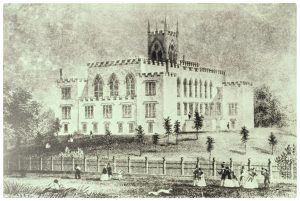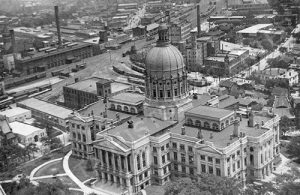by Andrew Allison
The Georgia Senate Press Office is the official place for the Georgia Senate to deal with the press and the media. It is a non-partisan office and is responsible for writing and sending out press releases, media advisories, columns, and opinion pieces for each of the 56 Senators at their request.
As its director, I’m in charge of our small team, which handles the above-mentioned communication needs and plans communications for the Georgia state Senate as a whole. We also live stream all official Senate meetings and activities on the Senate floor and run all of the Senate’s social media accounts.
Research is a constant part of our job. If a lawmaker wants to file a bill on a particular topic, we often research the issue in general, keep an eye on how the news covers it, and find out what everyone’s positions are before writing a press release, column, etc. Sometimes, these topics are timely, and most research can be done quickly. There are times, however, when we need more in-depth tools to find historical data on specific legislative topics.
I actually first found out about the DLG recently when, earlier this year, we had a slower day at work and several new staff members in our office. I thought it would be a good idea for us all to take the generic tour of the Capitol that the Georgia Capitol Museum provides, just to find out if there was anything we didn’t already know about the place we work.
That tour was eye-opening in several ways, and the tour guide provided a great deal of information that I (even being obsessed with Georgia’s political history and having worked here for over six years) never knew. When we asked where we could find out more, she suggested we take a look at the Digital Library of Georgia. It’s been one of my most frequently visited websites ever since.
Several images we have used in our publications recently that we found inside the DLG include the old state Capitol in Milledgeville and an older image of the current Capitol building.


The primary publication the DLG has been essential in making a reality is The Parliamentary Inquirer, which our office started earlier this year. This magazine aims to highlight the work the Georgia General Assembly undertakes outside of the session and share some fun and informative stories about Georgia politics and history. Simply put, we could not produce a magazine of this caliber without the help of the DLG. There is no other place where primary source documents and images are so readily available and searchable. For example, we recently did an article on the history of Georgia’s state capitals.
I was about to find a copy of the Senate Journal from the day the General Assembly formally changed from a temporary meeting space to the building they use today. For additional context, I found newspaper archives (also through DLG) that described a reporter’s perspective of the festivities surrounding the procession from the old Capitol to the new one. Items like this have traditionally been so difficult to come by. Having them so easily accessible has allowed us to add historical context our work would otherwise be lacking.
I am sure there are collections and features we haven’t yet taken full advantage of. However, the resources supplied by the Atlanta History Center are always very insightful and unique. Without the primary source documents and photos available through DLG, the value of publications like The Parliamentary Inquirer would be severely lacking. Having access to these old legislative records, photographs, journals, and newspaper clippings adds so much to our production value and constantly helps us generate new ideas for future articles.
Typically, we work on our magazine articles during downtime during the day, as our primary job responsibilities are to ensure our senators have everything they need. Therefore, being able to search for something online when we have a few spare minutes is far preferable. Simply put, if these materials were not available for free online, it is likely we would not have utilized the DLG due to funding constraints. If the content existed behind a paywall, we would never have been able to access it.
The DLG is an excellent reflection of the demographics of our state. For example, we worked on an article about Georgia’s historically black colleges and universities (HBCUs), and, through publications made available through the DLG, we could locate student newspapers and newsletters from several HBCUs dating back to the 19th century. In the past, the struggle has always been to find primary source documents from rural Georgia. While we have yet to run into any specific issues locating any materials, we find that documents from small, rural towns are harder to come by, and appreciate when those are made available.
Readers can follow the Georgia Senate Press Office at the following social media handles:
Twitter: @GASenatePress
Instagram: @gasenatepress
Facebook: facebook.com/GeorgiaStateSenate
LinkedIn: linkedin.com/company/georgia-senate-press

